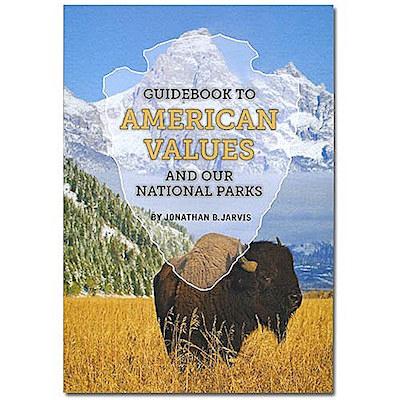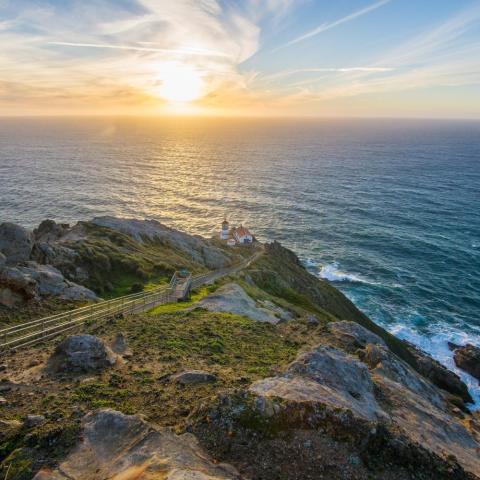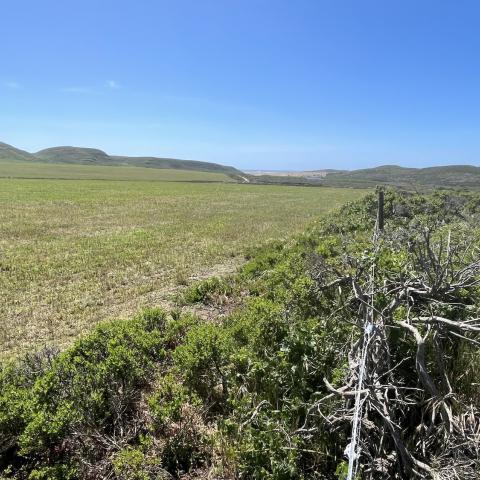
This is not an ordinary book review. The only reason I know about this book is because I read in the news that National Park Service Director Jonathan Jarvis had been disciplined for writing it, so this review will also discuss that context.
As readers of National Parks Traveler know, the book was the subject of an Office of Inspector General investigation that found Mr. Jarvis had intentionally skirted the Interior Department's Ethics Office to write it, and that the director lied to Interior Secretary Jewell about some of the details.
The IG report tells us that Interior Department officials are concerned that the book looks like a government publication, which it is not. Indeed it does look like one, with a huge NPS arrowhead logo on the front cover containing the book’s title and the name of its author (Jonathan B. Jarvis), and a bison that overlaps with the arrowhead; the effect is of the NPS logo come to life.
The IG report tells us that some of the DOI officials interviewed were concerned that the use of Mr. Jarvis’s job title in the book is inappropriate, creating the appearance of government endorsement.
The report says, “Two areas in the book reference Jarvis’ government title: his biography in the back, which highlights various positions that he has held at NPS, and the book’s preface, written by writer and producer Dayton Duncan.”
In fact, there is another place Director Jarvis’s title is used, and used very prominently: the blurb on the back cover. The purpose of the blurb is, of course, to explain to people who are considering purchasing the book what the book is about. Here’s the blurb, in its entirety:
As it celebrates its centennial, the National Park Service now manages more than 400 special places. In these pages, Jonathan Jarvis, the 18th director of the National Park Service, adds a new chapter in the evolution of the national park idea. National parks, he asserts, are expressions of our values. What unites this increasingly diverse system of natural wonderlands and historic sites, in an increasingly diverse nation, are the values we share in common--and Jarvis provides an impressive list of parks and the values they illuminate. –Dayton Duncan
According to the IG report, “Jarvis stated that he purposely tried to downplay his government position in the book by limiting the use of his title and using a photo of himself not wearing his NPS uniform.”
This is disingenuous at best. Director Jarvis’s position is not downplayed, it is a central feature of the book’s narrative. That’s clear from what he said to the IG: “Jarvis said that the book ‘wasn’t about’ him; it was about what he was trying to accomplish in his tenure as Director.” But that is a distinction without a difference.
This is not just a book about American values, or a book about the relationship between those values and the national parks; it is very clearly a book about Director Jarvis’s vision of those two things—a very active vision, in which he himself “adds a new chapter in the evolution of the national park idea.”
The spotlight on Director Jarvis goes beyond the blurb and the preface. The book’s Epilogue -- which, like the blurb, is not mentioned in the IG report -- is not only written by Director Jarvis, it is written in the first person, about his experiences in the NPS. It begins: "As a young ranger during the winter of 1976-1977, I spent many a cold, windy day in the marble chamber of the Thomas Jefferson Memorial in Washington D.C. On the coldest days, hours would pass without a single visitor, so I was alone with Mr. Jefferson. His writings, carved into the porticos, became familiar verse...."
There is a very real sense in which this is a book “about” Director Jarvis. That alone seems unbecoming.
The values discussed in the book are not in themselves controversial. They include such universal values as Integrity, Honesty, Respect, Conservation, Restoration, and Science. What’s painful here is that Director Jarvis’s career reflects a marked lack of adherence to such values.
Many National Parks Traveler readers made this point in their comments on Traveler's story about the OIG investigation, saying Director Jarvis’s ethics lapse is “evidence of a culture of arrogance and abuse of power.” Readers have provided a long list of investigations and complaints that show a pattern of “gross mismanagement” and “cover-ups” under Director Jarvis, and have pointed out that “Violating agency policy and then justifying it to the Inspector General as ‘risk taking’ demonstrates he neither understands nor appreciates the burden of leadership responsibility.”
My own experience with Director Jarvis supports this perception. For almost a decade, I watched as Mr. Jarvis, first as Western Regional Director and then as National Park Service director, supported Point Reyes National Seashore in leveling serious false charges against a third-generation Point Reyes rancher who restored the historic Drakes Bay Oyster Farm only to have it snatched from the community and destroyed to create an artificial “wilderness.” There is a grotesque contrast between the actions taken against Drakes Bay Oyster Company and the values Director Jarvis claims he embraces: Enterprise, Entrepreneurship, Hard Work, Ingenuity, Science, and Working Lands.
To represent the value “Working Lands,” Director Jarvis profiles Grant-Kohrs Ranch National Historic Site in Montana. The passage reads in part: “From the family farm, forest, and ranch, Americans have formed a working-class of people tied to the lands that encompass the green pastures of the Shenandoah, to the Great Plains of the Midwest, and the fertile valleys of California. At times romanticized, Americans today are still working their lands as a family garden, or a manicured lawn, or as multigenerational farmers and ranchers. The National Park Service keeps this value alive through a variety of sites.”
Grant-Kohrs Ranch is a historic site only. It commemorates the cattle ranching of the past. Does Mr. Jarvis really think that Working Land that is no longer working “keeps this value alive”? How does Mr. Jarvis square his claim to admire Enterprise and Entrepreneurship with his agency’s ruthless and entirely unprincipled fight against a family farm that exemplified those virtues? How can Mr. Jarvis claim to believe in Science as a value when his agency has been caught red-handed committing scientific fraud?
The Guidebook to American Values and Our National Parks, by Jonathan B. Jarvis is, as Mr. Jarvis suspected, a book that should never have been published.
Sarah Rolph has closely followed the case of the Drakes Bay Oyster Co. and its fight against the National Park Service to remain in business at the seashore. She is writing a book about its last steward, Kevin Lunny. Along with other Drakes Bay supporters, Sarah created and continues to maintain the advocacy website http://savedrakesbay.com/core/




 Support Essential Coverage of Essential Places
Support Essential Coverage of Essential Places







Comments
Sarah I think your review is quite petty and amateurish. On the subject of the book you set yourself up as judge and jury. It's quite obvious what's driving your intent and agenda. Amatuerish is a kind chracterization for your abuse of this platform. Speaking of ethics. Using this as a forum for personal attacks certainly lacks any journalistic integrity and your vitriol is disgusting. You really should examine resentment, it is toxic personally, and it is toxic and undermining of this society.
Regarding the book I think it is a fine addition to the national celebration of the Centennial of the National Park Service. It will certainly cause folks to deeply and fondly remember their own personal connections, joy, and value experiences, and that of their loved ones, to the sites they have visited. It will ignite their passion to explore deeper "their National Treasures" and pass it on! The tenet "a more Perfect Union" comes to my mind. If you narrow mindedly purport the values attributed to the significance of each of these sites as a conclusion, you are way off beam. Appreciation is in the mind and spirit of the beholder. A point you entirely miss.
Concerning Drake's Bay Oyster Farm issues, when they entered the lease it clearly stated that upon expiration of the lease term the site would be reclaimed for its Congressional Wilderness Desigantion. It belongs to the people, not the lessee. Also as I recall, it was upheld in Federal Court and also given due consideration by the Secretary of the Interior, and I am sure in extensive consultation with many. Hardly a unilateral decision by Dirctor Jarvis. That premise is laughable.
Reagrding Director Jarvis, I personally appreciate his beginnings as a seasonal and his many accomplishments through his career that led to his Presidential and Congressional appointment to steward our National Treasures and Heritage. There are many accomplishments in his long public service dedication that niether you or I are aware of. I don't hear you complaining about the removal of the Elwah Dam and his long career in protecting, preserving, and restoring our natural resources and ecosystems. Director Jarvis in his tenure has turned the ship of the National Park System onto a directed course of forward thinking, progress, relevance, diversity and inclusiveness as core values. I thank Mr. Jarvis for his dedication and what he has had to endure for our greater good.
Back to journalism 101 for you. F
I learned nothing about the book, and it sounds like the author is using this premise to continue her personal vendetta. I don't have an oar in the water either way, but from this review I gain no clue about the book.
Sarah, I am fully sympathetic with Drakes Bay cause and believe that was terribly mishandled. Further, I am no appologist for Jarvis in other "management" matters as I don't know enought about them to opine. But, I must say, this is far from an objective book review and I think much has been made of little on the book deal.
He was writing about what he wanted to accomplish in the parks. He was doing it on his own time without compensation. There was no personal gain sought or obtained. Did you write about his "vision"? About the things he wanted to do? No you focused on "him" and activities totally outside the scope of the book and the fact he (actually the editor) used his title and Eastern National used the Arrowhead - as it had on previous occassions. This wasn't a book review, it was a personal attack. Perhaps warranted for other transgressions but not under the auspices of an objective literary piece.
All three of the commenters above have said very well what I am thinking. I'll try to find a copy of the book so I may read it and draw my own conclusions. But for right now, I'm wondering exactly who Sarah Rolph is and why she has such an obvious axe to grind.
"Her upcoming book about Drakes Bay Oyster Farm tells the story of a historic oyster farm in Point Reyes, California that the Park Service is trying to remove for unstated reasons of its own."
This from her website. Tells you a bit about what oar she has in the water.
Having long experience with Ms. Rolph's on-going vendettas against those with whom she disagrees, I am not at all surprised about the attack-dog tone of her supposed "book review." But the more fundamental and interesting question is why the National Parks Traveler would stoop to publish such an obvious ad hominem attack on the Director of the National Parks? The National Parks Traveler bills itself as " the world's premier national parks news and information website," but Ms Rolph's screed is neither news nor information. So what oar does the National Parks Traveler have in the water?
Perhaps NPT is trying to have an oar on both sides of the boat. Keeps you from going around in circles. I applaud Kurt for presenting alternative points of view and leaving them open for discussion. Let the thoughts pass or fail on their merit, not on some editor's bias.
But if ecbuck's point about letting "thoughts pass of fail on their own merit, not on some editors bias" were actually the logic by which the National Parks Traveler publishes articles...then it is illogical and contradictory that our comments on those same articles are not published until "approved by a moderator."